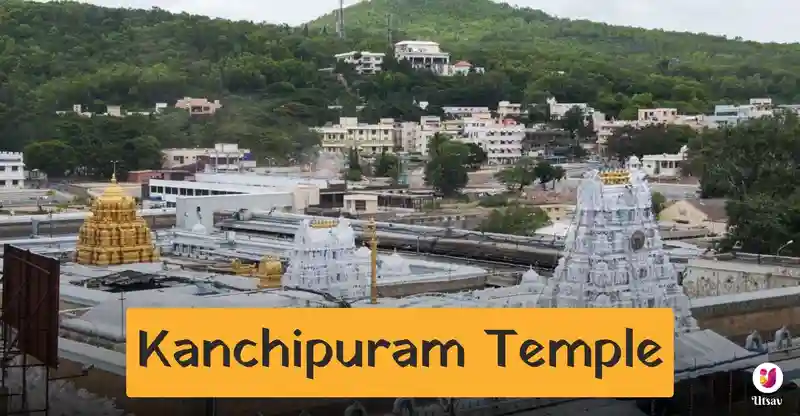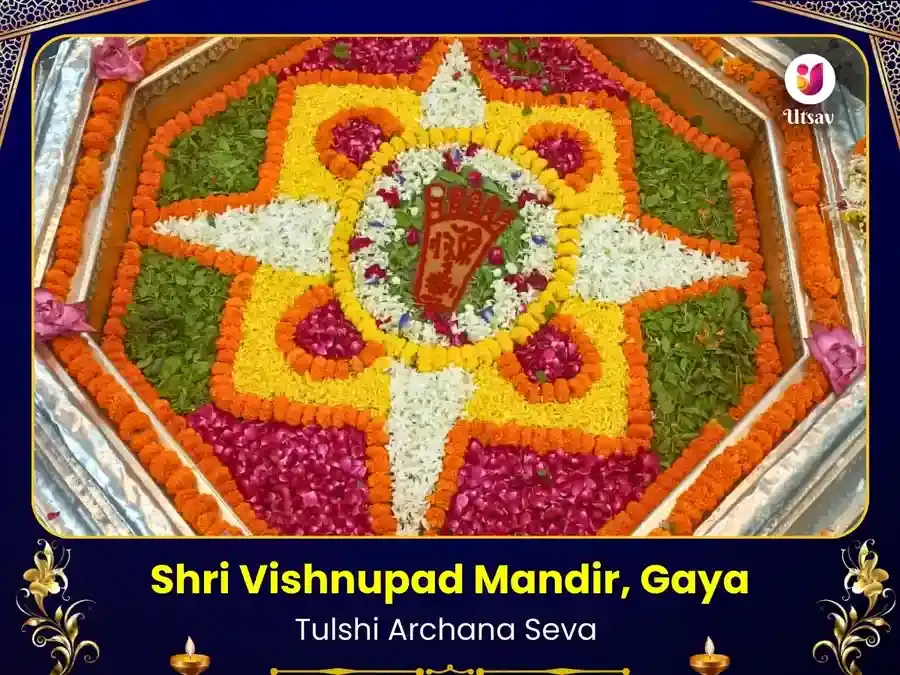Exploring the sacred heritage: Kanchipuram Temple
Thu - May 30, 2024
8 min read
Share
Table of contents
1.History of Kanchipuram Temple
2.Significance of Kanchipuram Temple
3.Why it's so special
4.Benefits of visiting Kanchipuram Temple
5.Location of the temple
6.Darshan Timings of the temple
7.Special festivals celebrated at Kanchipuram Temple
8.How to reach the Temple

History of Kanchipuram Temple
The Kanchipuram Temple, located in the ancient city of Kanchipuram in Tamil Nadu, India, is a significant historical and religious site, renowned for its architectural splendor and spiritual legacy. Known as the "City of Thousand Temples," Kanchipuram's history dates back over two millennia, flourishing during the reigns of the Pallava, Chola, and Vijayanagara dynasties. The city became a major center for Tamil learning and culture, with its temples, particularly the Kanchi Kailasanathar Temple and the Ekambareswarar Temple, exemplifying Dravidian architecture. These temples were not only places of worship but also hubs for social and cultural gatherings, playing a pivotal role in the dissemination of Hindu philosophy and traditions. The Kanchipuram temples are adorned with intricate carvings, majestic gopurams (gateway towers), and vast courtyards, reflecting the artistry and devotion of the ancient builders. Over the centuries, these temples have been meticulously preserved and continue to attract pilgrims and tourists alike, bearing testament to Kanchipuram's enduring spiritual and historical significance.
Significance of Kanchipuram Temple
The Kanchipuram Temple holds immense significance both spiritually and culturally. As a major pilgrimage site in Tamil Nadu, it is revered for its association with Hinduism, particularly the worship of Lord Shiva and Lord Vishnu. The temples of Kanchipuram, such as the Ekambareswarar Temple dedicated to Shiva and the Varadaraja Perumal Temple dedicated to Vishnu, are considered among the holiest in the region. These temples are not only centers of worship but also epitomes of Dravidian architecture, showcasing exquisite carvings, towering gopurams, and sprawling courtyards. Historically, Kanchipuram was a hub for Tamil learning and culture, with its temples playing a crucial role in the dissemination of religious and philosophical ideas. The city's association with revered saints and scholars, like the Alvars and Nayanars, adds to its religious prestige. Additionally, the temple festivals, marked by vibrant processions and rituals, draw thousands of devotees, highlighting the temple's role in fostering community and preserving traditions. Thus, the Kanchipuram Temple stands as a symbol of spiritual devotion, architectural brilliance, and cultural heritage.
Why it is so special
The Kanchipuram Temple is exceptionally special due to its profound spiritual, historical, and architectural significance. Here are several reasons why it stands out:
1. **Spiritual Importance**: Kanchipuram, known as one of the seven moksha-puris (places of liberation), is a vital pilgrimage destination for Hindus. The temples, particularly the Ekambareswarar Temple dedicated to Lord Shiva and the Varadaraja Perumal Temple dedicated to Lord Vishnu, are central to Shaivism and Vaishnavism, two major Hindu traditions.
2. **Ancient Heritage**: The city's temples, some of which date back over a thousand years, are living relics of India's rich historical and cultural past. They were major centers of learning and spirituality during the reigns of the Pallava, Chola, and Vijayanagara dynasties.
3. **Architectural Marvels**: The temples of Kanchipuram are renowned for their Dravidian architecture. They feature intricately carved sculptures, majestic gopurams (towering gateways), and expansive courtyards. The Kanchi Kailasanathar Temple, for instance, is celebrated for its detailed sandstone carvings and unique design.
4. **Cultural Hub**: Historically, Kanchipuram was a significant center for Tamil learning and culture. The temples were not just places of worship but also venues for cultural activities, including music, dance, and literary discourses. They played a crucial role in the dissemination of Tamil literature and religious philosophy.
5. **Festivals and Rituals**: The temple festivals, marked by elaborate rituals and vibrant processions, are a testament to the living traditions of Hindu worship. These events attract thousands of devotees from across India, reinforcing the temple's role in community bonding and cultural preservation.
6. **Association with Saints and Scholars**: Kanchipuram is associated with many revered saints and scholars, such as the Alvars and Nayanars, who contributed significantly to Hindu religious literature and practices. The city's spiritual legacy is enriched by their teachings and devotion.
Benefits of visiting Kanchipuram Temple
Visiting the Kanchipuram Temple offers numerous benefits, encompassing spiritual, cultural, and personal growth aspects. Here are some key advantages:
1. **Spiritual Upliftment**: Pilgrims find immense spiritual solace and a sense of peace in the sacred atmosphere of Kanchipuram's temples. The city's association with moksha (liberation) makes it a place where devotees seek blessings and spiritual enlightenment.
2. **Cultural Enrichment**: Visitors can experience the rich cultural heritage of Tamil Nadu through the temple architecture, rituals, music, and dance performances. The temples are living museums of Dravidian art and culture.
3. **Architectural Appreciation**: The intricate carvings, towering gopurams, and expansive courtyards of the temples are marvels of Dravidian architecture. Appreciating these structures provides insight into ancient engineering and artistic techniques.
4. **Historical Insight**: Exploring Kanchipuram's temples offers a glimpse into the region's historical significance. The city's temples have witnessed the reigns of various dynasties, including the Pallavas, Cholas, and Vijayanagaras, making it a rich source of historical knowledge.
5. **Festivals and Celebrations**: Participating in temple festivals, which are vibrant and colorful, allows visitors to experience the joy and communal harmony that these celebrations foster. They offer a chance to witness traditional rituals and local customs.
6. **Learning and Education**: The temples have been centers of learning since ancient times. Visitors interested in Hindu philosophy, Tamil literature, and South Indian history can gain valuable insights from the temple inscriptions and the stories behind the deities.
7. **Community and Social Interaction**: Visiting these temples fosters a sense of community as devotees come together for worship, festivals, and other religious activities. It provides an opportunity to meet and interact with people from diverse backgrounds.
8. **Personal Growth**: The serene environment and the act of participating in temple rituals can be meditative and grounding, promoting personal well-being, mindfulness, and mental peace.
9. **Culinary Experience**: The prasadam (sacred food offering) distributed in temples offers a taste of traditional South Indian cuisine, providing a unique culinary experience.
10. **Handicrafts and Shopping**: Kanchipuram is famous for its hand-woven silk sarees. Visitors can shop for these exquisite textiles, supporting local artisans and experiencing the region's traditional craftsmanship.
Location of the Temple
The Kanchipuram Temple, located in the ancient city of Kanchipuram in the state of Tamil Nadu, India, is situated about 72 kilometers (45 miles) southwest of Chennai, the state capital. This historic city, often referred to as the "City of Thousand Temples," is well-connected by road and rail, making it accessible for pilgrims and tourists.
Kanchipuram itself is divided into two parts: Shiva Kanchi and Vishnu Kanchi, each hosting a multitude of temples dedicated to Lord Shiva and Lord Vishnu respectively. Some of the most prominent temples include:
1. **Ekambareswarar Temple**: Dedicated to Lord Shiva, this temple is located in Shiva Kanchi.
2. **Kanchi Kailasanathar Temple**: Also dedicated to Lord Shiva, it is renowned for its architectural beauty and is located in Shiva Kanchi.
3. **Varadaraja Perumal Temple**: Dedicated to Lord Vishnu, this temple is situated in Vishnu Kanchi.
4. **Kamakshi Amman Temple**: Dedicated to Goddess Kamakshi (Parvati), this temple is centrally located in Kanchipuram.
The city's temples are spread across different parts of Kanchipuram, and exploring them often involves traveling within the city. The area is well-served by local transport options, including buses, auto-rickshaws, and taxis, facilitating easy access to the temples for visitors.
Darshan Timings of the Temple
The darshan timings for the major temples in Kanchipuram are generally consistent, but they can vary slightly depending on the temple and specific days or festivals. Here are the typical darshan timings for some of the prominent temples in Kanchipuram:
1. **Ekambareswarar Temple**:
- **Morning**: 6:00 AM to 12:30 PM
- **Evening**: 4:00 PM to 8:30 PM
2. **Kanchi Kailasanathar Temple**:
- **Morning**: 6:00 AM to 12:00 PM
- **Evening**: 4:00 PM to 7:00 PM
3. **Varadaraja Perumal Temple**:
- **Morning**: 6:00 AM to 12:00 PM
- **Evening**: 3:00 PM to 8:00 PM
4. **Kamakshi Amman Temple**:
- **Morning**: 5:30 AM to 12:00 PM
- **Evening**: 4:00 PM to 8:00 PM
These timings are typical but may be subject to change, especially during festivals, special occasions, or specific temple rituals. It's always a good idea to check the latest timings before planning your visit, either through the temple's official website or by contacting the temple authorities directly.
Special Festivals celebrated at Kanchipuram Temple
Kanchipuram, known as the "City of Thousand Temples," celebrates numerous festivals with great fervor and enthusiasm. Some of the most significant festivals celebrated at the Kanchipuram temples include:
1. **Brahmotsavam**:
- **Temples**: Ekambareswarar Temple, Varadaraja Perumal Temple
- **Details**: This grand annual festival spans 10 days and includes elaborate processions of the deity on various vahanas (vehicles), such as the Garuda and the Silver Chariot. It attracts thousands of devotees from all over the country.
2. **Panguni Uthiram**:
- **Temples**: Ekambareswarar Temple, Kamakshi Amman Temple
- **Details**: Celebrated in the Tamil month of Panguni (March-April), this festival marks the celestial wedding of Lord Shiva and Goddess Parvati. It is a significant event, with special rituals and processions.
3. **Vaikunta Ekadasi**:
- **Temples**: Varadaraja Perumal Temple
- **Details**: Observed in December-January, this festival is of great importance in Vaishnavism. It is believed that the gates of heaven open on this day, and special prayers and rituals are conducted. The highlight is the Sorgavasal (heavenly gates) procession.
4. **Navaratri**:
- **Temples**: Kamakshi Amman Temple
- **Details**: This nine-night festival dedicated to Goddess Durga is celebrated with devotion and grandeur. The temple is beautifully decorated, and various forms of the goddess are worshipped each day. Cultural programs and devotional music performances are also organized.
5. **Kamakshi Amman Annual Festival**:
- **Temple**: Kamakshi Amman Temple
- **Details**: This festival, also known as the Aadi festival, takes place in the Tamil month of Aadi (July-August). It includes special poojas, abhishekams, and processions of the deity.
How to reach temple
Kanchipuram is well-connected by road, rail, and air, making it accessible for pilgrims and tourists. Here are the various ways to reach Kanchipuram:
### By Air:
- **Nearest Airport**: The closest airport is Chennai International Airport (MAA), located about 72 kilometers (45 miles) away from Kanchipuram.
- **From the Airport**: You can hire a taxi or take a bus from Chennai Airport to Kanchipuram. The journey by road typically takes around 1.5 to 2 hours.
### By Train:
- **Kanchipuram Railway Station**: Kanchipuram has its own railway station, which is well-connected to major cities in Tamil Nadu and neighboring states.
- **Major Trains**: Regular trains run between Kanchipuram and cities like Chennai, Bangalore, Chengalpattu, and Tirupati.
- **From the Railway Station**: Local transport options such as auto-rickshaws and taxis are available to reach the temples within Kanchipuram.
### By Road:
- **From Chennai**: Kanchipuram is about 72 kilometers southwest of Chennai. The journey by car or bus takes approximately 1.5 to 2 hours.
- **Route**: You can take NH48 (Chennai-Bangalore Highway) and then follow the signs to Kanchipuram.
- **From Bangalore**: Kanchipuram is about 280 kilometers east of Bangalore. The journey by car or bus takes about 5 to 6 hours.
- **Route**: Take NH48 (Bangalore-Chennai Highway) and then follow the signs to Kanchipuram.
- **Bus Services**: Tamil Nadu State Transport Corporation (TNSTC) and private bus operators run regular buses to Kanchipuram from Chennai, Bangalore, and other major cities in Tamil Nadu.
### Local Transport:
- **Auto-Rickshaws**: Widely available for short distances within the city and to various temples.
- **Taxis**: Available for hire for city tours or temple visits.
- **Buses**: Local buses operate within Kanchipuram, connecting various parts of the city.
Share
Offer Puja to Ganeshji
🪔
Puja for Success & Cleaning Negative Energies
Gaya Vishnupad Visesh Vishnu Sahasra Tulsi Archana Puja
Shri Vishnu Pad Mandir, Gaya
Thu - Sep 11, 2025 - Chaturthi Shraddha
1.0k+ Devotees